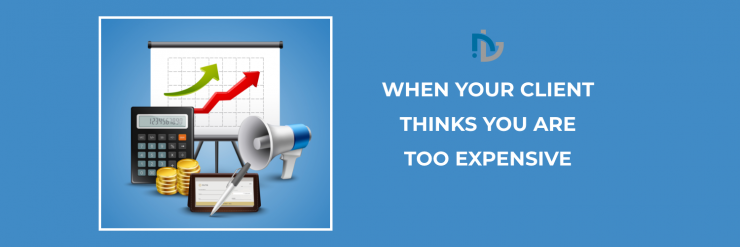If you’ve been in the industry for any amount of time, You’ve been working merrily along with a client or collaborator. Things are going well and you’ve had good results so far.
Now, you’ve reached a crossroads and you need them to make a decision, sign off on the work, or pay an invoice.

You’ve heard this objection from clients before.
Response 1: Say nothing, Stay quiet
here is no reason why you should feel the need to defend yourself. So don’t respond and don’t take it personally.
In fact, seasoned negotiators very often use the ‘stay quiet’ technique, as the other party (often less experienced) will feel uncomfortable with silence, and they start talking, hereby often coming down with their request.
Response 2: Say in your most friendly; confident voice: ‘Yes, you are right
Your work is high quality, an original idea or design, you have taken years to develop your skills, so yes: it is expensive.
Explain to your client the real value of your work, your skills, your materials. If they are buying a unique piece of craft or are working with a highly skilled designer then they will need to pay for that experience and profile.
If they are buying a future heirloom that has been lovingly created and that will be enjoyed for decades to come, then relatively speaking it isn’t that expensive.
Share with your clients the real value of your work, the processes and time involved.
Present it in high-quality venues or online boutiques with your peers. If you communicate and present your work well, then your clients will realise it’s worth it.
Response 3: Ask your client: ‘What makes you say that’?
Talking directly with clients is a great way to find out more, and to discover what motivates your client. Ask questions in an inquisitive (non-aggressive or frustrated!) way to let them open up to you.

If you listen to their objections carefully then you can learn a lot about how potential clients perceive your work. You can respond to potential misconceptions by answering their questions or make strategic changes in your positioning or presentation.
Especially if a trade buyer or seasoned collectors says that your work is expensive, take note! If a retailer purchases your work then their markup will double or triple the retail price that the consumer will pay. You need to be aware of the calculations trade buyers use to take this into account.
Very often new designers and craftspeople are too expensive to sell their work to trade, due to the markups. If you want to sell wholesale in the longer term, then you need to start with selling to consumers at the beginning and become more efficient and effective in your working methods so that your prices become more competitive for retailers.
Continuously work on improving how you communicate the value of your work – in a verbal and visual way (think branding and photography here).
Response 4: Ask your client: ‘What’s your budget?’
If your client is commenting on the price then they are already in a ‘buying mood’, or at least they are considering your work.
Instead of you setting the price, ask your potential client what their budget is. If they are looking to buy they will often have a budget in mind. If not, then they might (not yet) be ready to buy anyway. So asking for their budget is a great way to find out how serious they are at this stage about purchasing from you.
If they give you a budget you can explain what you could do within their budget. If you do this in some detail in writing in the form of a design brief and quote, then that sets very clear, and professional expectations from the start, and stops wasting your and your clients’ time.
“Each party should gain from the negotiation.”
Response 5: Ask yourself: ‘Has my client actually said that, or is that just me thinking that?’
Very often (newish) designers and makers worry that they are too expensive, that they themselves would not be able to afford their own work. But you are not your own client!
Make sure that you are dealing with the facts, and not with your own worries or insecurities about the value of your work
Response 6: Ask yourself: ‘Is cost an ‘easy’ excuse?’
So your client has indeed said that you are too expensive.
But is that actually true? For many people who are buying something mentioning the cost is often the easiest way out if they don’t want it (anymore).

What they actually mean when they say you are too expensive is …
‘Re-doing my website is a lot of hassle, maybe it can wait’,
‘I can’t make my mind up, let’s wait till after Christmas’,
Response 7: Ask yourself: ‘Are you selling in the right place, to the right people?’
Pricing your products or services isn’t easy because it often comes down to where you want to position yourself. What might be perceived ‘expensive’ in one place, isn’t in another place (especially true online when you sell on marketplaces such as Etsy or online boutiques, but also at craft markets were people try to haggle more often than in shops or at craft fairs.)
So, if you are considered to be too expensive then do more research into where your peers are showing and selling, what their price levels are and start showing in a place more suitable for your pricing and positioning.
Bonus Tip: Tell yourself: ‘If your clients never tell you that you are too expensive, then you are probably too cheap.’
I got this advice a couple of months ago and realized it’s very true.
Be prepared for a little bit of negotiating, especially when dealing with trade buyers, as it’s part of the game. It’s nothing personal, it’s how some people do business.







